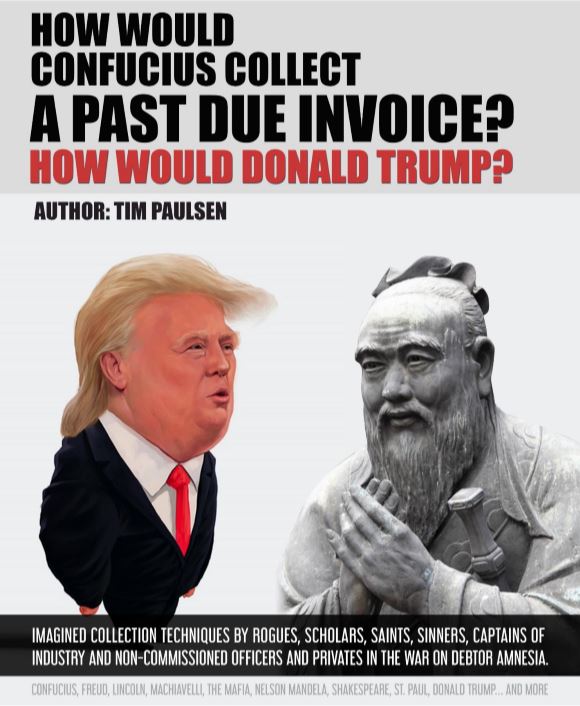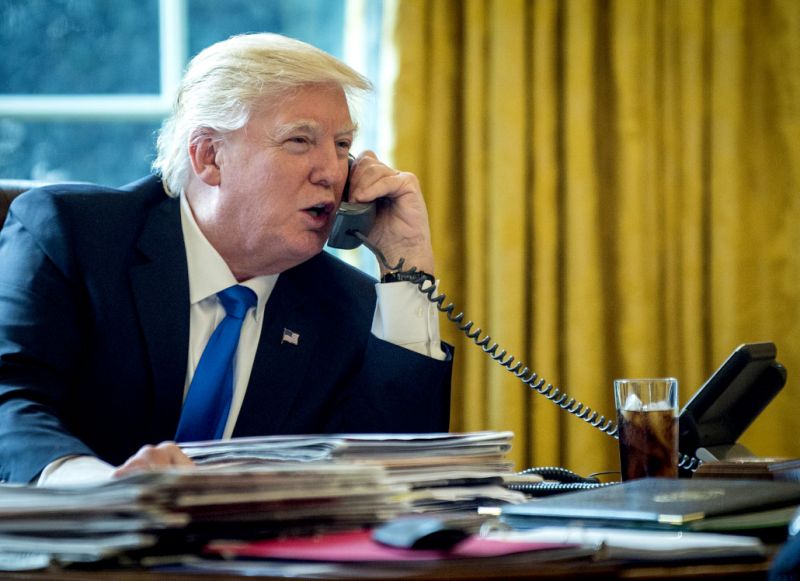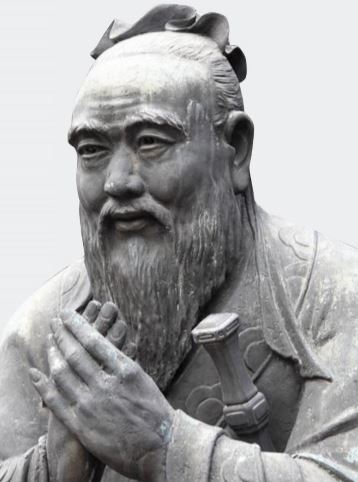
EDITORIAL
I was recently introduced to a fun read by, author and international collections expert, Tim Paulsen, that I found as a fun read. While different than consumer collections, the parallels are similar enough for relevance. In his later chapters, he illustrates the various tactics that would be used by a number of famous persons such as; Sigmund Freud, The Mafia, Nelson Mandela and Jesus of Nazareth.
Overall, it’s a fun read that I’ll post more of if this gathers enough interest or, for a full version, please contact Tim at his website shown below.
Introduction: Some people call it completing the sale and some invoice management. Many consultants refer to it as managing risk. There are a few of us that call it by the well-known yet perhaps distasteful bill collections. For most of this book, we simply refer to it as ‘collections’. After all, to paraphrase William Shakespeare (chapter 9), ‘call it by any other name and people, eventually, will still wrinkle their nose’.
Some of you will remember the comedian Rodney Dangerfield who made a successful career out of ‘I get no respect’. As far as professions are concerned… well, let me put it this way: In one of my seminars on effective collection techniques, when I told the audience that collections was the second oldest profession in the world, someone in the second row piped up and said, ‘And, the least reputable of the two’.
No respect. That’s us.
Yet, they can’t do without us, can they? I have worked with many organizations around the world. I often ask them, “How long do you think your firm would survive if you did not have a collection department?” A firm with a good product and service might, just might manage six to eight months. Human nature will come into play, squeaky wheels and all. While it does matter that you have a good product and service, if you don’t ask for the money – you don’t tend to get it. And those firms that do not ask for it well, tend to get it last…if at all.
This business of effective collections is both an Art and a Science. Most firms have CMS (Collection Management Systems), automated dialers, behavioural scoring and much more. In collections, like so many other fields, science allows us to be incredibly productive compared to the way we worked just a few years ago. However, when push comes to shove, metaphorically speaking, you still have one person talking to another on the telephone, by email, letter or perhaps in person, trying to convince them to do something they don’t want to do – and like it. That my friends, is an Art.
How then, might some of the best persuaders in history have fared as a collector? Like the title says, how would Confucius collect a past due invoice? Saint Paul, who one author called “The Greatest Salesman in the World” was no slouch when it came to writing letters, you only need to ask the Corinthians, how might he have sent an email?
Is there something for us to learn by imagining the techniques used by some of the most successful and perhaps notorious people who have ever lived. I think so and I hope that you do to.
It seems to me there are lessons to be learned and much fun to experience.
Care to join me?
How Would Donald Trump Collect a Past-Due Invoice?

Hear the call, please click here!
Some people make a name for themselves and others make themselves a name. Donald Trump has been on a mission for quite a few years with his name and although ‘not politically incorrect’ may not begin to accurately describe his approach and comments and even though his best friends and family might like to wrest twitter use away from him, nobody can argue that he has not put the name of Trump front and foremost at every level of reporting and news in North America and beyond.
When working at the Trump Tower in earlier years, his first task of the day was to review all news reports that mentioned the Trump name. Some people claim that Donald Trump is not consistent. If putting the name Trump on hotels, towers and people’s lips has been his mission, he has been consistent and very effective.
There have been numerous reports about Donald Trump and his habits and philosophy of paying his bills. If the reports are to be believed, there are many businesses, particularly in the small and medium range, who report delays and then often, not being paid in full. Some reports call it, “The Trump Discount”. What does Mr. Trump say? He will tell you that an aggressive style is necessary for success and as far as non or delayed payment, he does not apologize. “If they do not finish or do a good job, I will deduct from their contract.”
However, all of those reports concern accounts payable, an area I sometimes refer to as ‘the dark side’. This chapter and the book deals with how Donald Trump, and others, would handle a situation when they are owed money. It isn’t as though Donald Trump has no experience in accounts receivable. When collecting rents for apartments back in the early years of business, he said it was a good idea to stand to the side of the door after you knocked, just in case the tenant would toss some hot water when they open the door.
Most of the time, when I teach collection techniques, I recommend that it is best to keep it professional and not take it personally. Most of the time. All of us might prefer a win/win in negotiations and collections.
Donald Trump, I believe, considers it a greater success the more he wins. Trump would consider non or delayed payment to him as an intention to do harm and he takes great pride in being a counter puncher. He would take steps to collect in full…and more. You might expect a single call and then it would be in the hands of his attorneys. Another reputation for Donald Trump is being litigious. The lawyers, his and probably yours, will make money. Maybe a lot.
Getting even is one thing, but I believe he would go beyond. He would want you or anyone else who owed him money to think very long and hard before you did not pay as agreed in the future. After all, ‘you started it’, by not paying him on time in the first place.
Pithy Quote: Revenge is sweet and not fattening.” – Alfred Hitchcock (But, tweeted by Donald Trump.)
How Would Confucius Collect A Past-Due Invoice?

First and most importantly, Confucius would rejoice. He might even do his ‘happy dance’. Why? Because he would be involved in a situation where he and his firm may want something that TOS (the other side) does not want to give.
If you don’t think that sounds like good news, you don’t know how Confucius thinks. He believed the source of all creativity and innovation is a result of dynamic tension. In other words, anyone can collect a past due invoice from a firm or individual who has money and is willing to pay. It takes the very best of what we are and what we can become, to deal with situations where the client may not have the funds or the willingness to pay. Sometimes the lack of money and the will, which is even more fun, eh?
The long-term objective will be to get TOS (The Other Side) to ‘come around’, to your way of thinking and to your side of the table. When you are successful, it becomes their idea to pay, you just get out of the way.
Gather information, both facts and opinions. Review the agreements, details and who approved within their organization. How have they paid you in the past? When did the payment pattern change? How do they pay their other suppliers now and what has changed? Has anything changed within your organization and how you invoice and follow up for payments? What about your sales team? Check them not only for information, but for recommendations. How about the economy and changes in the market for them and for their clients?
When, and only when, you have gathered information, set up a discussion/meeting with your client. You are still in the fact-finding phase and your objective is to listen with an open mind. Confucius would spend whatever time is needed to let the client know there is a situation that the two of you will be hoping to resolve. The client is becoming a member of the committee tasked with the objective of resolving the past due invoice. You are not making demands at this point, but asking for their help.
They may propose a repayment plan that is acceptable, but you should be prepared with one of your own. It should reflect the ability of the firm, be achievable, and naturally enough, with fast results. Some flexibility may be called on your part. While you prefer the more ambitious repayment plan, you prefer one less so, if it will include commitment by your client.
Once they have agreed, better yet, they have proposed, and you have agreed, document and send by letter or email. Ensure that you follow up with reminders as well as thanks, where and when appropriate.
Confucius, as Carol reminds us in her book, says that the person who is brusque in their movements will not obtain co-operation and if they ask for something without first establishing relations, it will not be given.
So, how would Confucius collect a past due invoice? He would become the ‘partner’ who clients want to pay.

By: Tim Paulsen
Managing Director, International Centre for Professional Collections – Toronto, Ontario, Canada – http://www.trpaulsen.com/
About the Author:
He speaks 8 languages fluently and ‘gets by’ in another six, the author of 9 books on Accounts Receivable and negotiations. He has an MBA from McGill and has ‘developed’ negotiation programs that are taught at Harvard and Notre Dame, for several years, he was a special envoy to the United Nations Finance Division and concerning his negotiation skills, Nelson Mandela once said…..
Hold on, just kidding….here is the real bio:
Tim Paulsen delivers exceptional training on effective collection techniques
In addition to having worked as a collector in both the consumer and commercial fields, Tim has been a credit fraud investigator, collection manager, credit manager and a management consultant.
He is the author of:
• ‘Paid in Full’
• ‘Tipping the Scales
• ‘Sex, Lies & Negotiation Techniques’
• ‘‘The Reluctant Collector’ (for Sales Representatives)
The Founder and Managing Director of The International Centre for Professional Collections (ICPC), Tim has consulted and trained across Canada and the United States as well as 26 other countries including: Bahamas, Brunei, China, Egypt, Ghana, India, Indonesia, Ireland, Jamaica, Kuwait, Lebanon, Malaysia, Mexico, Oman, Pakistan, The Philippines, Singapore, Turkey, South Africa and Thailand.
Mr. Paulsen is the creator of two exceptional tools to improve collection productivity:
• ‘SAGE – The Excuse Terminator’
• ‘The CollectABILITY Index®.’










